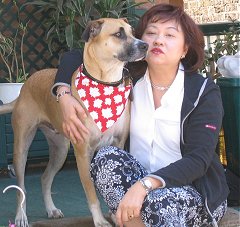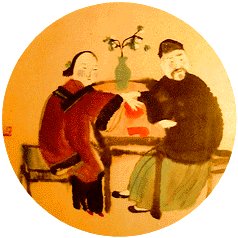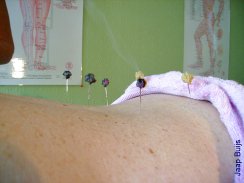
|
A monthly publication of Pure Energy Rx www.pureenergyrx.com 1-Service Voice Mail: 620-399-7462 | 1.21.2006 |
|
Profound Chinese Medicine
by Boyd Martin
Chinese medicine was just a part of Cheng's life, and little did she know at the time that it was her destiny. "I grew up surrounded by Chinese Herbs and unexplained and un-clarified dietary advice. I never thought that I would practice Traditional Chinese Medicine, but when the opportunity was presented to me I was drawn to the subject like a magnet; I have not stopped since. It became important to understand the unexplained and the unclarified principles that I was taught from childhood. It has become a great part of my life today and I value the teachings and the profound knowledge of Traditional Chinese Medicine." Cheng studied Traditional Chinese Medicine in Canada with a Chinese Doctor in Toronto. In 1988, she began her clinical practice, and by 1994 she was doing her advanced clinical studies in Shanghai, China, under the guidance of medical masters, working in an out-patient clinic of Shanghai First People's Hospital. Cheng also broadened her knowledge with continuing education in Japanese and Korean acupuncture techniques studying with many renowned practitioners. With a background in Aesthetics (trained in London) she uses her knowledge today in Facial Rejuvenation treatments using acupuncture. Cheng has taught professionally at the Canadian College of Naturopathic Medicine and the Canadian Memorial Chiropractic College. She is a regular guest lecturer at York University in Toronto. She started the Acupuncture and Traditional Chinese Medicine Institute in 1995, bringing in world renowned speakers for TCM, Qigong and TaiChi.
Unfortunately, the Western tendency is to seek out medical help only when there is a problem. This mindset is actively promoted by the "see-your-doctor" commercial media, that focuses attention on cures and balms, rather than promoting a preventative approach to overall health. "And, worse than that," says Cheng, "Patients only seek help from Chinese medicine when Western medicine cannot help. Very seldom in clinical practice do I get a patient walking in saying, 'I really don't have anything serious, but my parents weren't so healthy. Could you assess me and maybe find a way to keep me healthy?' Traditional Chinese Medical practitioners spend an hour to an hour and a half in consultation to assess your constitutional health and your health concerns. It is our belief that: the further back you look the further forward you can see. The ability to read a body before structural damage occurs enables Chinese Medicine to prevent disease before it develops or to slow down the progression of generative diseases. We tend to want to treat the root cause of a problem, not just the manifestations of signs and symptoms. " This individualization is something Western medicine cannot accommodate, since the entire system focuses on getting a diagnosis that matches a known condition that then can be administered a drug. "The Traditional Chinese practitioner feels your pulse observes your tongue and face, studies your health history to determine your constitutional health and determines the kinds of imbalances that you have in the body," says Cheng. "Obviously, Western medicine has its place--I think it's really good for emergency and acute conditions when you need to correct something right away."
"One of the biggest mistakes that I have encountered is the self-prescribing Chinese Herbs," says Cheng. "There have been many articles written about the efficacy of certain herbs, and has resulted in the Western Herbal manufacturers making remedies focusing on one singular herb. In Chinese Herbal Medicine formulations are made up of four or more herbs, and have a particular purpose of harmonizing, balancing the body, and offsetting the effects of other herbal medicines in a particular prescription. We usually do not prescribe singular herbs. It is also not advisable to go to a health food store to buy a Chinese Herb because of an article in a magazine. Herbs have certain properties and can create a greater imbalance in your body." Cheng points out that Chinese medicine is all about energy, and correcting the subtle imbalances occurring on the day-to-day, rather than waiting until the imbalances turn into measurable and miserable conditions. "If you look at statistics, you'll see that Chinese women suffer less during menopause, because all the little imbalances and problems that arise from their menstrual cycle and changes in life are very much corrected as you go. So a lot of Chinese women traditionally change their diet. They know what to do, and make adjustments through their life--try to keep the theory of moderation in their lifestyle."
Cheng stresses that the entire approach to health with Chinese medicine is to create balance--not just in the body, but in life. "Promoting smooth flow of Qi throughout the whole body can be achieved through lifestyle changes, practicing moderation in all aspects of our lives, whether it is diet, emotions, or work; or a balance between personal life and working life. Anything excessive is not good because your body will eventually suffer from it."
Because Chinese medicine is all about energy, Cheng has made extensive use of Pure Energy Rx formulas. "What attracted me to the subtle energy products is because of some of the descriptions that it is a little bit like acupuncture without needles. I have taught patients to use the E-1, E-2, and E-4, locally. That is, if they have the E-3 cream, and they want to enhance the effect of the stress relief, they can actually put one or two drops of E-1 into the cream and use it. It strengthens the effect of the cream." Even Otis, Cheng's dog, has been rewarded for his association with her. "Animals, pets, respond really well to energy medicine. My dog takes Chinese herbs regularly, and I include the subtle energy medicine: E-1 for when he needs calming, E-2 to balance his digestive organs, and E-4 as a foundational support. Otis gets the E-3 cream for any kinds of little nicks, cuts and bruises, or itching on the skin. For calming I take a little bit of the cream and pet his forehead with it. I wouldn't live without E-1, E-2, E-3 or E-4. They're just great." Cheng has made available a line of equine energy medicines, as well, at pawpourripethealth.com.
Cheng uses the subtle energy formulas to increase the speed and effectiveness of her treatments. "The E-3 cream is used on all patients who are sensitive before starting an acupuncture treatment," says Cheng. "For complicated cases or emotional conditions, I like to begin with the energy medicines before I introduce Chinese herbs. Chinese herbs have a long, long history of effectiveness, but it is still a substance which you need to absorb and break down. Energy medicine can prepare the body for accepting Chinese herbal medicine." In her busy Toronto practice, Cheng Koh continues to change people's lives, giving them new tools to achieve the level of health they want. "I just found Chinese medicine to be so profound," enthuses Cheng, "Especially as a preventative medicine. Today, I feel sorry sometimes for people who don't see that. You can use it to correct a problem, obviously, but their ability to keep someone healthy is so profound."
Contact Cheng Koh, D.Ac., CMD, Dipl.Ac.(NCCAOM), at her clinic, 276 Willard Avenue, Toronto, Ontario, Canada, phone: 416-767-6266. |
 Cheng Koh grew up with Chinese Medicine in Singapore. Her father owned an herb dispensary, and her grandmother was a village barefoot doctor, taking pulses and subscribing herbs. "She taught my father a lot about Chinese Herbal Medicine. As a child growing up, anytime that I was sick it was off to my Father's herbal dispensary and if he can't cure us then we were off to see the Western Doctor! So I grew up with Chinese Medicine first and Western Medicine last. Today, most of us use Western Medicine first and Chinese Medicine as a last resort."
Cheng Koh grew up with Chinese Medicine in Singapore. Her father owned an herb dispensary, and her grandmother was a village barefoot doctor, taking pulses and subscribing herbs. "She taught my father a lot about Chinese Herbal Medicine. As a child growing up, anytime that I was sick it was off to my Father's herbal dispensary and if he can't cure us then we were off to see the Western Doctor! So I grew up with Chinese Medicine first and Western Medicine last. Today, most of us use Western Medicine first and Chinese Medicine as a last resort."
 Chinese Medicine has a tradition spanning over 5,000 years, and incorporates several modalities. "This I call the ancient art of healing," says Cheng. "It is a complete system on its own using Acupuncture, Chinese Herbal Medicine, massage, nutrition, exercise with Qigong and TaiChi, and meditation. These techniques all focus on regulating and controlling the flow and balance of energy, Qi. This is the goal and essence of Traditional Chinese Medicine: harmony and balance. Our bodies become ill when we are not in harmony and balance. Chinese medical theory allows for preventative therapy. If you think back on how the Chinese emperors had their physicians by their side, they were there to keep them healthy. That was their role. This medicine excels in its preventative therapy."
Chinese Medicine has a tradition spanning over 5,000 years, and incorporates several modalities. "This I call the ancient art of healing," says Cheng. "It is a complete system on its own using Acupuncture, Chinese Herbal Medicine, massage, nutrition, exercise with Qigong and TaiChi, and meditation. These techniques all focus on regulating and controlling the flow and balance of energy, Qi. This is the goal and essence of Traditional Chinese Medicine: harmony and balance. Our bodies become ill when we are not in harmony and balance. Chinese medical theory allows for preventative therapy. If you think back on how the Chinese emperors had their physicians by their side, they were there to keep them healthy. That was their role. This medicine excels in its preventative therapy."
 Because most people seek out Chinese medicine in the hope of getting some immediate relief from symptoms, many practitioners have resorted to a "cookbook" type of prescription. Cheng stresses it is important treat the whole person, history and all, over time. "When you take into account a patient's basic constitutional health, it enables you to prescribe individualized treatment whether it be a point prescription for acupuncture or a herbal prescription customized for that patient's pattern of disharmony."
Because most people seek out Chinese medicine in the hope of getting some immediate relief from symptoms, many practitioners have resorted to a "cookbook" type of prescription. Cheng stresses it is important treat the whole person, history and all, over time. "When you take into account a patient's basic constitutional health, it enables you to prescribe individualized treatment whether it be a point prescription for acupuncture or a herbal prescription customized for that patient's pattern of disharmony."
 "Chinese medicine is very logical in its explanation of how things work," says Cheng. "For example, we call something like 'Qi stagnation,' energy that is 'stuck,' and does not move properly. I like to use this analogy: Imagine Qi and blood in the body to be like traffic moving on a highway--smooth flow, no congestion, everybody gets to where they need to go. Congestion, slowing down of traffic, will lead to traffic jams. A traffic jam is similar to serious health problems like heart attacks, strokes, tumors, cancers, etcetera. We treat when your traffic is slowing down. Western Medicine treats traffic jams. A common example can be seen in pre-menstrual syndrome with breast swelling and distension, mood swings, bloating and menstrual cramps. These symptoms are not acceptable to Chinese Medicine as it indicates that the Qi and blood do not flow freely."
"Chinese medicine is very logical in its explanation of how things work," says Cheng. "For example, we call something like 'Qi stagnation,' energy that is 'stuck,' and does not move properly. I like to use this analogy: Imagine Qi and blood in the body to be like traffic moving on a highway--smooth flow, no congestion, everybody gets to where they need to go. Congestion, slowing down of traffic, will lead to traffic jams. A traffic jam is similar to serious health problems like heart attacks, strokes, tumors, cancers, etcetera. We treat when your traffic is slowing down. Western Medicine treats traffic jams. A common example can be seen in pre-menstrual syndrome with breast swelling and distension, mood swings, bloating and menstrual cramps. These symptoms are not acceptable to Chinese Medicine as it indicates that the Qi and blood do not flow freely."
 From the Chinese medicine perspective, adopting the balancing lifestyle for a person should go beyond practitioner treatments. "Tai chi, Qigong and Yoga are the three best exercises for the promotion of Qi & blood flow," says Cheng. "Qi and blood moves freely through the body when the body is in a calm, relaxed state. Any exercise that puts your body in a tense state--like playing squash, rock climbing--- any activity that puts your tendons and muscles in a tight, tense position for too long, will eventually create joint problems. Those who like those forms of tense exercises or working out in a gym need also to do the Tai Chi, Qigong or Yoga. The more you like those kinds of exercises, the more you have to do Tai Chi, Qigong or Yoga as you need to balance your body between those forms of activity. One relaxes, the other tightens."
From the Chinese medicine perspective, adopting the balancing lifestyle for a person should go beyond practitioner treatments. "Tai chi, Qigong and Yoga are the three best exercises for the promotion of Qi & blood flow," says Cheng. "Qi and blood moves freely through the body when the body is in a calm, relaxed state. Any exercise that puts your body in a tense state--like playing squash, rock climbing--- any activity that puts your tendons and muscles in a tight, tense position for too long, will eventually create joint problems. Those who like those forms of tense exercises or working out in a gym need also to do the Tai Chi, Qigong or Yoga. The more you like those kinds of exercises, the more you have to do Tai Chi, Qigong or Yoga as you need to balance your body between those forms of activity. One relaxes, the other tightens."
